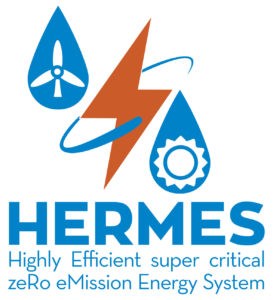HERMES
High-efficiency supercritical zero-emission energy system
Brief description
The latest EU energy scenarios rely on an increasing share of renewable energy sources (RES) to help achieve the target of a 55% reduction in greenhouse gas emissions in 2030 and an overall reduction in CO2 emissions in the order of 80-95% by 2050.
Gas turbines (GT) are an essential part of the backbone of EU electricity generation and will continue to play an important role in centralized and decentralized energy supply. They have numerous advantages for power generation, such as efficiency, reliability, the unique ability to vary output quickly to stabilize the power grid and balance demand with highly fluctuating supply. These advantages are accompanied by low noise and emission levels. For reliable, efficient, and controlled large-scale power generation, gas turbines are a very good technology for power generation when combined with renewable fuels such as hydrogen, methane, methanol, ethanol, ammonia, and dimethyl ether.
However, a breakthrough is needed to take GT technology to the next level of the EU Green Deal. Future-proof GT technology must be flexible to run on renewable fuels, have high efficiency of additional 20%, and do not emit greenhouse gases or pollutants. This capability will ensure security of supply and prepare for future fuel infrastructure development.
Objectives of the project
The main objective of HERMES is to develop and evaluate the performance of a closed-cycle renewable energy system based on a direct-fired supercritical gas turbine. It should be possible to operate with liquid and gaseous renewable fuels, such as methanol and hydrogen, to generate electricity (and heat) with efficiencies above 65%, with net zero greenhouse gas emissions and no emission of other pollutants. HERMES’ zero-emission GT combines three unique features:
- Renewable fuel interchangeability;
- Operation of the GT under supercritical conditions with carbon-neutral fuels and firing with pure oxygen instead of air;
- Deployment of decentralized CO2 capture, utilization, and storage without additional large-scale storage requirements, resulting in a closed-loop system.
Work tasks OWI
Basic experimental research on fuel chemistry under high pressure CO2 atmosphere:
- Determination of the laminar burning rate of gaseous and liquid HERMES fuels by experiments using the heat flux method under elevated pressure.
- Investigation of the ignition behavior of gaseous HERMES fuels
Performing research institutions
- Universiteit Twente
- Ethnocon Metsovion Polytechnion
- Exergia Energy and Environment Consultants AE
- TEC4FUELS GmbH
- OWI Science for Fuels gGmbH
- Imperial College of Science Technology and Medicine
- CERFACS, Centre Européen der Recherche et de Formation Avancée en Calcul Scientifique
- Paul Scherrer Institut
- OPRA Engineering Solutions B.V.
- Ecole Polytechnique Fédérale de Lausanne
- Politechnika Wroclawska


Project funding
The EU research project “HERMES” is funded by the European Union within the framework of the research and innovation program HORIZON EUROPE under the grant number 101083748.
Project duration
10/ 2022 bis 10/ 2024
Contact
Dipl.-Ing. Sebastian Feldhoff
Tel.: 02407/ 9518-117
E-Mail: S.Feldhoff@owi-aachen.de
To the press release
